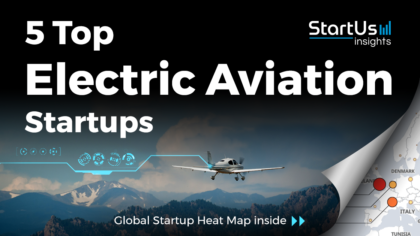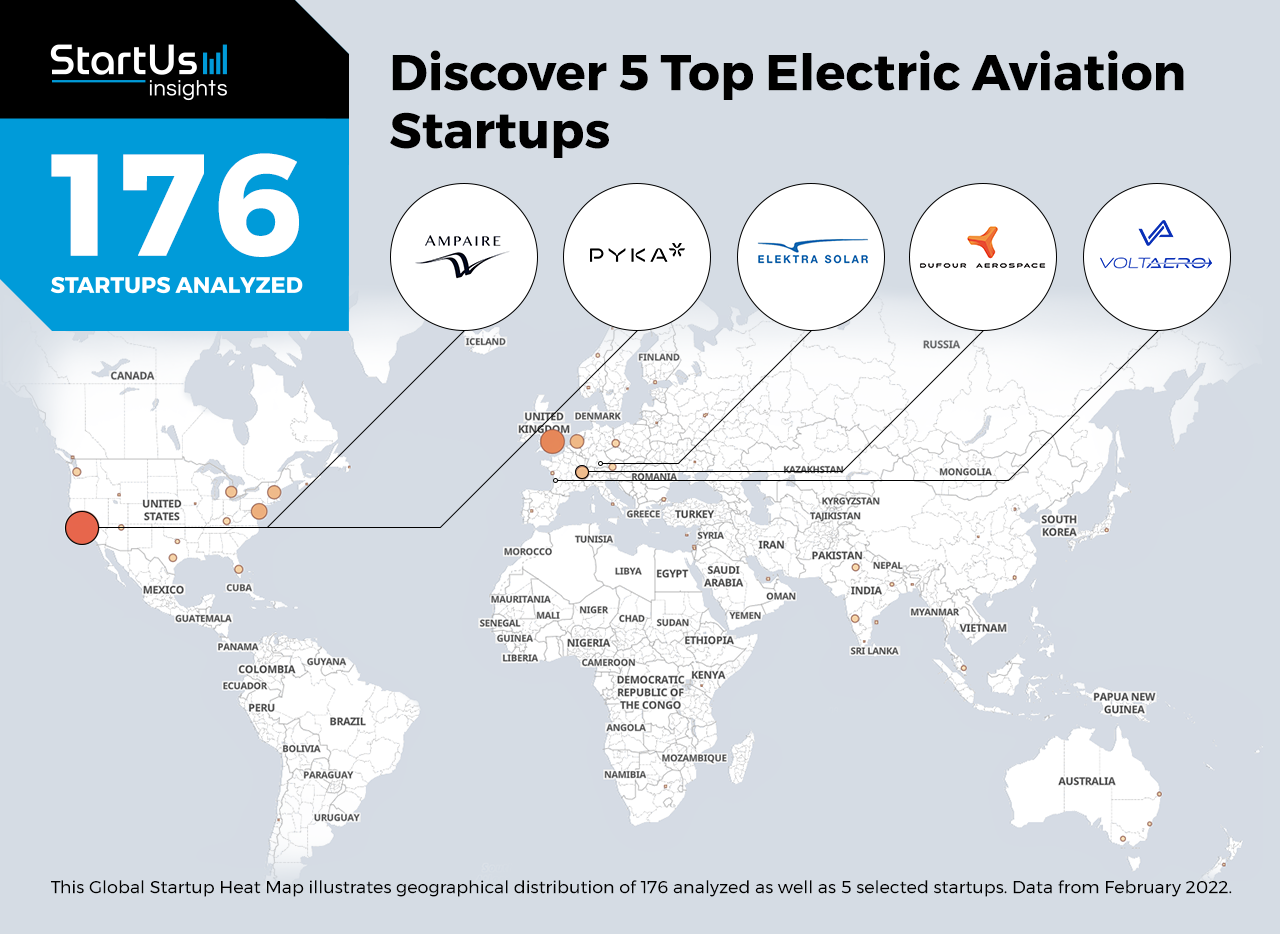Accelerate Productivity in 2025
Reignite Growth Despite the Global Slowdown
Staying ahead of the technology curve means strengthening your competitive advantage. That is why we give you data-driven innovation insights into the aviation industry. This time, you get to discover five hand-picked electric aviation startups.
Out of 176, the Global Startup Heat Map highlights 5 Top Electric Aviation Startups
The insights of this data-driven analysis are derived from the Big Data & Artificial Intelligence (AI)-powered StartUs Insights Discovery Platform, covering 2 093 000+ startups & scaleups globally. The platform gives you an exhaustive overview of emerging technologies & relevant startups within a specific field in just a few clicks.
The Global Startup Heat Map below reveals the distribution of the 176 exemplary startups & scaleups we analyzed for this research. Further, it highlights five aviation startups that we hand-picked based on criteria such as founding year, location, funding raised, and more. You get to explore the solutions of these five startups & scaleups in this report. For insights on the other 171 electric aviation solutions, get in touch with us.
Ampaire develops Hybrid Electric Aircraft
Founding Year: 2016
Location: Los Angeles, USA
Partner for: Electric Air Travel
US-based startup Ampaire builds a range of electric aircraft such as its ELL, a testbed aircraft for the development of high-powered electronics inverters, motors, and related systems. Tailwind is a fully-optimized performance-focused electric aircraft and Eco Otter SX is a 1-megawatt low-emission aircraft that operates as a cargo hauler and bush plane. The aerospace industry is also one of the biggest contributors to global greenhouse gas (GHG) emissions. To tackle climate change, Ampaire develops sustainable and economic electric-powered aircraft to transport both cargo and passengers and decarbonize the transportation industry.
Dufour Aerospace advances Electric Tilt-Wing Technology
Founding Year: 2017
Location: Visp, Switzerland
Funding: USD 11 M
Partner for: Electric VTOL Aircraft
Swiss startup Dufour Aerospace develops electric-powered aircraft with vertical take-off and landing (VTOL) capabilities. The startup utilizes its tilt-wing technology to offer electric drone and passenger aircraft, Aero 2 and Aero 3 respectively, that enable a stable transition while reducing power consumption. Its electric propulsion systems offer high energy efficiency when compared to combustion motors and the motors require less maintenance due to having fewer parts. VTOLs were previously unable to utilize this method previously due to the inefficient battery systems. Dufour Aerospace’s aircraft recharge their battery systems during their flight to overcome the current limitations of battery technology.
Pyka provides Autonomous Agricultural Airplanes
Founding Year: 2017
Location: Oakland, USA
Funding: USD 11 M
Partner for: Autonomous Electric Aircraft
US-based startup Pyka manufactures specialized autonomous electric airplanes for complex agricultural operations. Its autonomous electric aircraft Pelican combines high payload capacity, precision, and drift reduction technologies to provide scalable and effective crop protection. Additionally, the aircraft features LIDAR-enabled collision avoidance, aerial 3D terrain mapping, and dynamic path planning. As farmers look to scale, they employ smart farming technologies such as drones and the internet of things (IoT). To accelerate the adoption of AgriTech solutions, Pelican covers vast areas of farmland in short durations to significantly support farmers.
VoltAero develops a Hybrid Power Module
Founding Year: 2018
Location: Medis, France
Partner for: Aircraft Electrification
French startup VoltAero develops proprietary hybrid power modules for application in aircraft. Its hybrid power module combines a 300-kilowatt internal combustion engine with three electric motors of 60-kilowatt each to deliver a total power of 480-kilowatt. VoltAero’s Cassio power module integrates redundancy features such that, in the case of failure of the electric motors, they automatically disconnect to help pilots land safely. The startup’s power module also enables aircraft to electrify their fleets without the need for self- or in-house electrification technology.
Elektra offers Solar-powered Electric Aircraft
Founding Year: 2016
Location: Landsberg am Lech, Germany
Funding: USD 6 M
Use for: Solar Aviation
German startup Elektra Solar produces both manned and unmanned electric solar aircraft systems. Its aircraft is composed of a solar generator and solar converter while serving as a range extender. The digital solar energy system is connected to the batteries and propulsion unit to power the motor directly. The system also charges batteries and is also capable of both processes parallelly. Moreover, the aircraft features a dual redundant propulsion system with two subsystems that are composed of motor, motor controller, battery, and power supply for avionics and autopilot. Elektra Solar uses solar power as a range extender for aircraft to reduce the amount of fossil fuel currently used in air travel.
Discover more Aviation Startups
Startups such as the examples highlighted in this report focus on power modules, solar energy aircraft, hybrid aviation systems as well as autonomous aircraft. While all of these technologies play a major role in advancing electric aviation, they only represent the tip of the iceberg. To explore aviation technologies in more detail, let us look into your areas of interest. For a more general overview, download one of our free Industry Innovation Reports to save your time and improve strategic decision-making.








